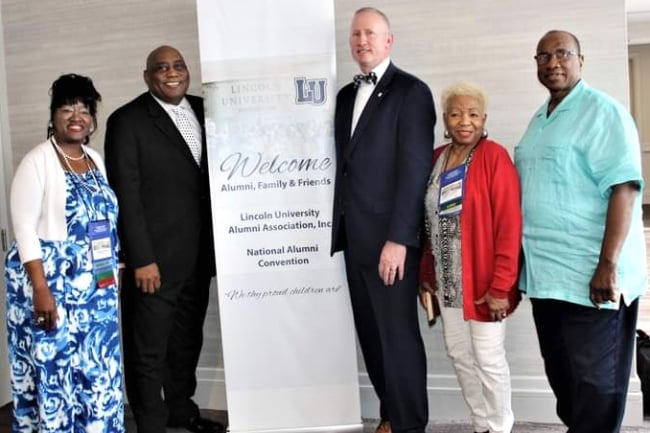You have /5 articles left.
Sign up for a free account or log in.

Alumni stand with Lincoln University president John Moseley (center) at a convention.
Lincoln University Alumni Association
Lincoln University leaders are cutting ties with the university’s alumni association until the association submits a financial audit and signs an agreement with the university governing their relationship, according to a recent letter to the association from Victor Pasley, president of the university’s Board of Curators. That agreement would prohibit the association from publicly criticizing the historically Black university in Missouri “or its representatives effective immediately.”
Pasley cited the board’s “ongoing concerns about the finances, management, and operations of the Lincoln University of Missouri National Alumni Association” as reason for the sudden move. He wrote that university leaders had tried for the past three years to pursue a “more productive relationship” with the association, ensure it aligned with the university’s mission to “serve the under-served African American community” and enter into a memorandum of understanding codifying the relationship.
“Unfortunately, our efforts have been unsuccessful,” the letter read. “Therefore, effective immediately, LUAA’s affiliation with LU is suspended.”
According to the letter, the association would have to complete a series of tasks to restore its relationship with the university, including hiring an independent accounting firm to do an audit of its finances for the past two fiscal years and provide the results to university leaders by September of this year. Association leaders must also reach an agreement with the board by December that includes creating an independent mailing address, establishing by July an independent financial management system to receive donations online and agreeing not to “publicly disparage” the university.
“This is not to discourage frank discourse between the LUAA or members of LUAA’s governing body or officers and appropriate representatives of the University,” the letter concluded.
Sherman Bonds, president of the alumni association, said he was taken aback by the letter, which was addressed to him. He told Inside Higher Ed that the association’s finances are stable and that the decision seemed like a power grab to punish alumni for being outspoken about university decisions.
“It’s very disappointing,” he said, describing the move as “bullying” and “shameful.” Bonds wrote in a response letter to the board Thursday that the association wasn’t aware of any concerns about its finances or management, and he noted that the suspension came without warning. He asked the board for details and documentation regarding how the board reached the decision and demanded an in-person meeting.
He also wrote that the university’s president, John Moseley, last year asked him to sign a memorandum of understanding that would have given the president “a high level of control” over the association. The association sent a counteroffer in April 2023, which was met with “silence.” That alternative memorandum of understanding, included in Bonds’s response letter, made demands of its own, including that the university hire a full-time alumni relations director and allow association members “full access” to the university’s Memorial Hall, which alumni funds helped rebuild, according to Bonds.
Bonds also emphasized to the board that the association had given at least $150,000 to the university over the last three years. He called Pasley’s note “a letter of reprisal, retaliation, intimidation and fear and an attempt to libel the LUAA to force it to comply with Victor Pasley’s demands.”
A History of Tensions
Bonds said many association members believe the suspension is “retaliation” for vocal condemnation of the university president and board members by some alumni earlier this year after the death by suicide of an administrator, Antoinette “Bonnie” Candia-Bailey.
Candia-Bailey, an alumna and then vice president of student affairs, accused Moseley of bullying her in a letter she wrote to him on the day of her death in January and in messages to board members, which were shared with some fellow alumni. Her suicide roiled the campus and touched a nerve with Black women academics around the country, who saw her as an emblem of the mental health challenges and poor treatment some of them have faced. The alumni association demanded the resignation of Moseley, who is white and who went on administrative leave after Candia-Bailey’s death.
It was not the first time the association has taken issue with Moseley’s leadership. Bonds and other alumni also previously disagreed with Moseley on other issues, including the language he used to describe the university.
Nonetheless, the board brought Moseley back from administrative leave in March and reinstated him after a third-party investigation found no proof that he bullied Candia-Bailey, prompting the association to issue a statement of no confidence in the board.
Some alumni believe Pasley is retaliating for the association’s opposition to the board’s decisions related to Candia-Bailey’s death, Bonds said.
“That’s all this is,” he said. “And then you create this mythological position about the soundness of our organization, you make these requests for audits, then you put out these specific demands.”
Tyrone Couey, founding member and president of the National Historically Black Colleges & Universities Alumni Associations Foundation, found the Lincoln board’s demands on the association to be “atypical.” He said alumni associations should be regularly reviewing their finances as a matter of course, and while some universities and alumni associations have a memorandum of understanding, it isn’t common. However, he’s less surprised to hear of demands like this at institutions where alumni association and campus leaders have been at odds.
Couey believes, in general, an alumni association publicly criticizing its alma mater is “risky” and should “really be the last resort” after internal dialogue within the institution.
“I would say that probably 95 percent to 99 percent of things can be resolved internally,” he said. “It’s almost like a family airing their dirty laundry. Unless it’s something really horrifying, that should not take place.”
He noted the unique difficulties of Lincoln’s specific circumstances.
“It’s just a painful situation, and I know how emotional people can get any time there’s a suicide,” he said.
Bonds said university employees aren’t in a position to speak out against board decisions, but alumni are more free to be outspoken, and that’s a power he believes the board is trying to take away.
“That’s a violation of the First Amendment,” he said.
Lincoln isn’t the only institution to cut ties with its alumni association. Bethune-Cookman University, also a historically Black institution, disbanded and replaced its alumni association with an in-house alternative earlier this year after a two-year legal fight. The Board of Trustees at Goddard College sent a cease-and-desist letter to its alumni association in 2021, accusing the group of trademark violations for using the college’s name after it issued a vote of no confidence in the board and president. Baylor University disassociated from its alumni association in 2009 and sued the association five years later to force it to stop using the university’s name and limit its activities to providing scholarships. Alumni at the New Jersey Institute of Technology also sued the institution in 2009 after they were told of plans to replace their association with a new group.
Bonds isn’t interested in a drawn-out legal battle. He said the association raises money for student scholarships, not legal fees.
“I think we should be able to sit down like civil adults and work out our differences,” he said.





